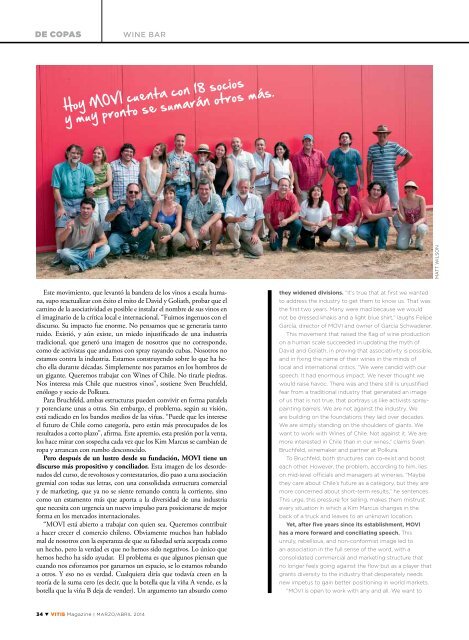rev_57
rev_57
rev_57
Create successful ePaper yourself
Turn your PDF publications into a flip-book with our unique Google optimized e-Paper software.
de copas<br />
wine bar<br />
matt wilson<br />
Este movimiento, que levantó la bandera de los vinos a escala humana,<br />
supo reactualizar con éxito el mito de David y Goliath, probar que el<br />
camino de la asociatividad es posible e instalar el nombre de sus vinos en<br />
el imaginario de la crítica local e internacional. “Fuimos ingenuos con el<br />
discurso. Su impacto fue enorme. No pensamos que se generaría tanto<br />
ruido. Existió, y aún existe, un miedo injustificado de una industria<br />
tradicional, que generó una imagen de nosotros que no corresponde,<br />
como de activistas que andamos con spray rayando cubas. Nosotros no<br />
estamos contra la industria. Estamos construyendo sobre lo que ha hecho<br />
ella durante décadas. Simplemente nos paramos en los hombros de<br />
un gigante. Queremos trabajar con Wines of Chile. No tirarle piedras.<br />
Nos interesa más Chile que nuestros vinos”, sostiene Sven Bruchfeld,<br />
enólogo y socio de Polkura.<br />
Para Bruchfeld, ambas estructuras pueden convivir en forma paralela<br />
y potenciarse unas a otras. Sin embargo, el problema, según su visión,<br />
está radicado en los bandos medios de las viñas. “Puede que les interese<br />
el futuro de Chile como categoría, pero están más preocupados de los<br />
resultados a corto plazo”, afirma. Este apremio, esta presión por la venta,<br />
los hace mirar con sospecha cada vez que los Kim Marcus se cambian de<br />
ropa y arrancan con rumbo desconocido.<br />
Pero después de un lustro desde su fundación, MOVI tiene un<br />
discurso más propositivo y conciliador. Esta imagen de los desordenados<br />
del curso, de <strong>rev</strong>oltosos y contestatarios, dio paso a una asociación<br />
gremial con todas sus letras, con una consolidada estructura comercial<br />
y de marketing, que ya no se siente remando contra la corriente, sino<br />
como un estamento más que aporta a la diversidad de una industria<br />
que necesita con urgencia un nuevo impulso para posicionarse de mejor<br />
forma en los mercados internacionales.<br />
“MOVI está abierto a trabajar con quien sea. Queremos contribuir<br />
a hacer crecer el comercio chileno. Obviamente muchos han hablado<br />
mal de nosotros con la esperanza de que su falsedad sería aceptada como<br />
un hecho, pero la verdad es que no hemos sido negativos. Lo único que<br />
hemos hecho ha sido ayudar. El problema es que algunos piensan que<br />
cuando nos esforzamos por ganarnos un espacio, se lo estamos robando<br />
a otros. Y eso no es verdad. Cualquiera diría que todavía creen en la<br />
teoría de la suma cero (es decir, que la botella que la viña A vende, es la<br />
botella que la viña B deja de vender). Un argumento tan absurdo como<br />
they widened divisions. “It’s true that at first we wanted<br />
to address the industry to get them to know us. That was<br />
the first two years. Many were mad because we would<br />
not be dressed khakis and a light blue shirt,” laughs Felipe<br />
García, director of MOVI and owner of García Schwaderer.<br />
This movement that raised the flag of wine production<br />
on a human scale succeeded in updating the myth of<br />
David and Goliath, in proving that associativity is possible,<br />
and in fixing the name of their wines in the minds of<br />
local and international critics. “We were candid with our<br />
speech. It had enormous impact. We never thought we<br />
would raise havoc. There was and there still is unjustified<br />
fear from a traditional industry that generated an image<br />
of us that is not true, that portrays us like activists spraypainting<br />
barrels. We are not against the industry. We<br />
are building on the foundations they laid over decades.<br />
We are simply standing on the shoulders of giants. We<br />
want to work with Wines of Chile. Not against it. We are<br />
more interested in Chile than in our wines,” claims Sven<br />
Bruchfeld, winemaker and partner at Polkura.<br />
To Bruchfeld, both structures can co-exist and boost<br />
each other. However, the problem, according to him, lies<br />
on mid-level officials and managers at wineries. “Maybe<br />
they care about Chile’s future as a category, but they are<br />
more concerned about short-term results,” he sentences.<br />
This urge, this pressure for selling, makes them mistrust<br />
every situation in which a Kim Marcus changes in the<br />
back of a truck and leaves to an unknown location.<br />
Yet, after five years since its establishment, MOVI<br />
has a more forward and conciliating speech. This<br />
unruly, rebellious, and non-conformist image led to<br />
an association in the full sense of the word, with a<br />
consolidated commercial and marketing structure that<br />
no longer feels going against the flow but as a player that<br />
grants diversity to the industry that desperately needs<br />
new impetus to gain better positioning in world markets.<br />
“MOVI is open to work with any and all. We want to<br />
34 ▼ Vitis Magazine l marzo/abril 2014


